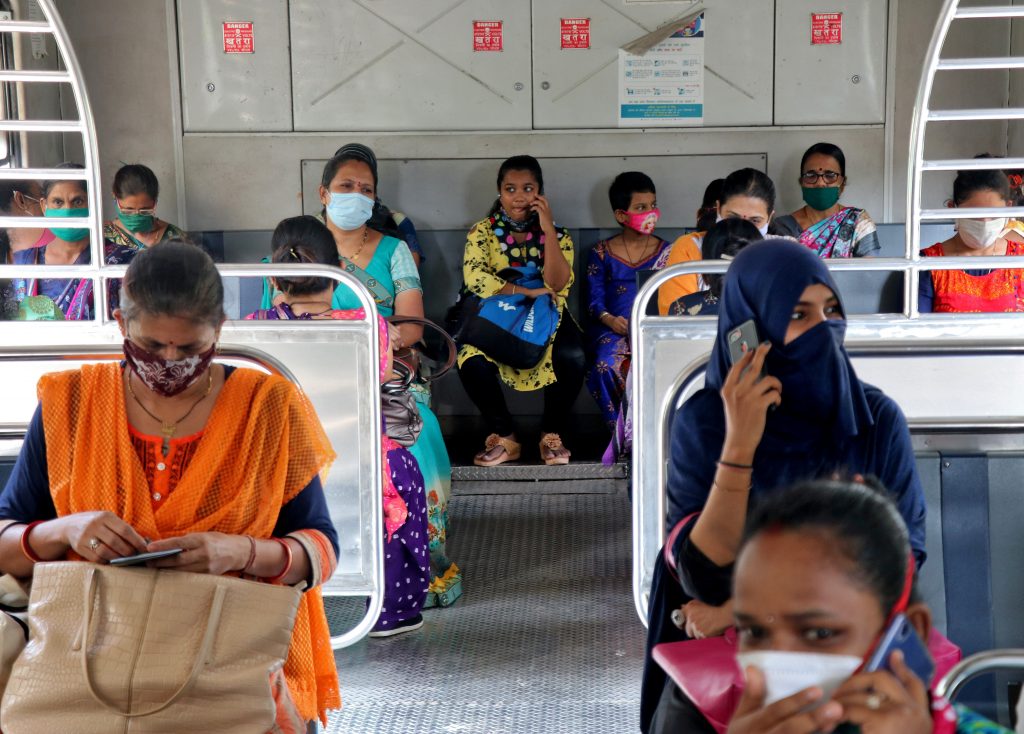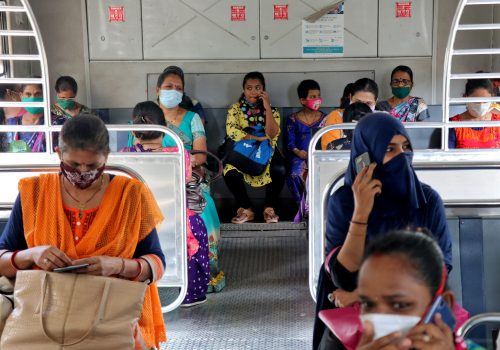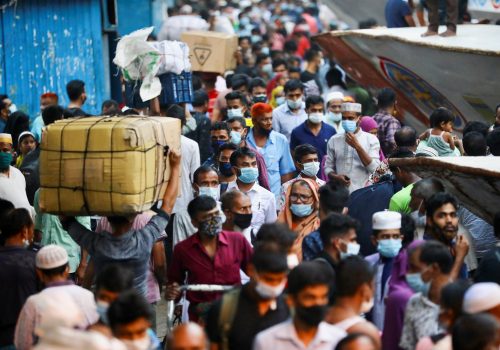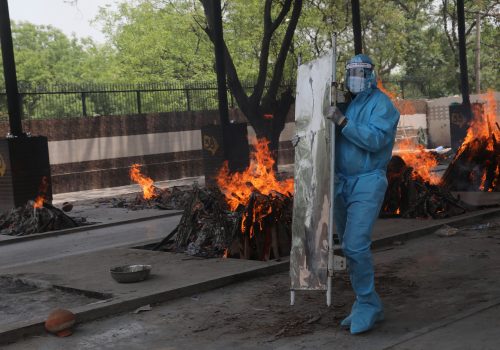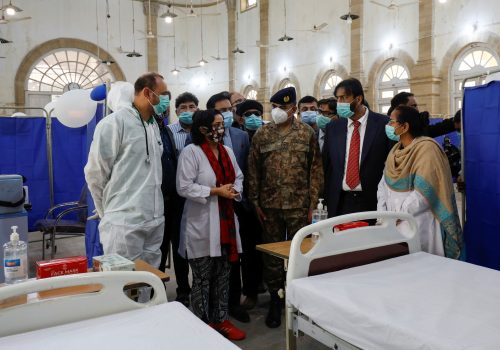On June 23rd, the Atlantic Council’s South Asia Center hosted a conversation with leaders of the REVIVE Alliance on the impact of the COVID-19 pandemic on the livelihood and resilience of the informal sector in India. The REVIVE alliance is a blended finance facility organized by Samhita-Collective Good Foundation (CGF), and funded by the US Agency for International Development in India (USAID), Michael & Susan Dell Foundation (MSDF), Omidyar Network India, British High Commission, New Delhi, and United Nations Development Programme (UNDP). This alliance involves various stakeholders dedicated to creating short-term economic recovery mechanisms and supporting long-lasting community building.
The panelists included South Asia Center non-resident senior fellow Dr Amita Vyas; Priya Naik founder and CEO of Samhita Social Ventures; Alison Eskesen, vice president of Mastercard Center for Inclusive Growth; and Rahil Rangwala, director of India programs at Michael & Susan Dell Foundation India. This conversation was moderated by Imrana Khera, partnership advisor at USAID/India.
Reflecting on the impact of COVID-19
COVID-19 hit India with immense force, creating a significant dent on what looked like a linear road to recovery. Amidst a strict national lockdown in the first wave and stringent decentralized lockdowns across India in the second wave, all the panelists called attention to the severity of the pandemic. Dr Vyas highlighted the bleak reality in post-March India, as well as the low vaccination rate. Likewise, Mr Rangwala highlighted the significant destruction of livelihood as well as the loss of life. In particular, he called attention to the loss of almost 10 million jobs in the second wave alone, declining household income, and the inflicted cross-sectoral damage. The impact of COVID-19’extends far beyond the overexerted pressure on healthcare systems. It brought the gaps in education, economic exclusion, and vast inequalities within society into the limelight. Furthermore, in a country with an already low women’s participation rate in the labor force, Ms Eskesen pointed out, COVID exacerbated inaccessibility while also exposing the lack of financial inclusion for women and members of the informal sector. All in all, the pandemic was “unveiling cracks already there,” stated Ms Eskesen. The pandemic’s effects, as the panelists stressed, are all interconnected; thus, solutions too must be innovative, quick, and mindful of this reality.
Reviving the informal sector amidst a global pandemic
COVID-19 created a need for a response that was inclusive and urgent. In particular, Ms Naik outlined what can be described as the need for an “integrated recovery” and “integrated support.” After establishing the on-the-ground realities of COVID-19, the panelists were able to share the various ways their organizations turned the challenges of the pandemic into opportunities for growth. As founder and CEO of Samhita Social Ventures, Ms Naik shared how her foundation was able to identify the gaps within the recovery process and identify essential tools such as digitalization and business development, which helped individuals and businesses hit hardest by the pandemic. Given the unequal impact of the pandemic, in particular the burden on women, her foundation targeted their efforts beyond just financial aid, focusing on the importance of confidence-building, and mental health support as well. Ms Eskesen highlighted a similar mission towards livelihood revival at Mastercard, emphasizing the importance of enabling small and micro-businesses to adapt to large shocks such as this pandemic through digitization and modernization. Empowering these businesses and individuals through credit access, and enhancing the recovery process for companies was another key goal of Mastercard’s efforts. For example, Mastercard identified the needs of smaller retail stores known locally as ‘kiranas’ and extended their aid to help them adapt to the formal sector while also realizing other areas for improvement, including reducing gender imbalance. Mr Rangwala from MSDF also shared how the pandemic pushed his organization to evaluate the newly emerging needs in response to the financial perspective of the crisis. Given the rise in risk aversion and a need for U-shaped recovery, Mr Rangwala identified the importance of “stretching the dollar,” or finding ways to help more people given limited resources. Overall, COVID-19 amplified the need for agility, inclusivity, and innovation, which inspired the REVIVE alliance. This collaborative effort connects stakeholders on every level. A critical facet of this endeavor includes the idea of returnable grants, which enables money to be cycled, and reduces the risk involved for those hurt most by the pandemic. Likewise, REVIVE is innovative in the way that it connects a variety of stakeholders, allowing what Ms Naik describes as “co-creating” impact, and allowing partners (including but not limited to corporations, philanthropic institutions, micro-entrepreneurs) to share their expertise without rigid arrangements, as well as create individualized solutions for individual problems.
Overall, the pandemic transformed how we look at the needs of micro-entrepreneurs, women entrepreneurs, and those within the informal sector. It amplified the need to address the inequality within communities while also pushing various sectors, including commercial and non-profit, to push the boundaries on what recovery means. COVID-19 gave businesses opportunities to stand up for the most vulnerable. In doing so, the REVIVE alliance has helped set the stage for a new, resilient normal. In particular, the panelists emphasized how returnable grants and other tools can help address the unique needs of those in the informal sector, the rising importance of digitization (made even more imminent by COVID-19), and issues of accessibility to financial resources. Through collaborations like REVIVE, the boundaries of recovery were pushed. The result was empowerment that extended beyond a single instance, making what Ms Naik describes as “impact with ambition,” which allowed for the creation of a support network for vulnerable communities.
Building towards a resilient and inclusive future.
Looking forward, there is a lot to learn from both the process and recovery from the COVID-19 pandemic. The pandemic has pushed for innovative collaborations, of which REVIVE is a thriving example. Given the distinctiveness of this collaboration, Mr Rangwala stated that there is an “obligation to learn from this experience.” In particular, because returnable grants have not been used in this manner or scale, consistent monitoring and continuous assessment are crucial to continuing to build towards a more equitable and resilient economy. Likewise, Dr Vyas highlighted the challenges of creating quick impact, stating, “impact doesn’t happen overnight.” Lastly, given the many stakeholders that have played a role in supporting the recovery process, the panelists were asked to expand on how the diaspora can address the situation. Ms Eskesen outlined the unique role the Indian diaspora, particularly in the US, can play. Given their deep understanding of Indian culture and customs as well as American innovative business practices, she argued that they can “meld both worlds.” Furthermore, Mr Rangwala explained some concrete ways in which the diaspora can direct their efforts on the ground to India’s “lively non profit collaborative network,” by supporting a framework already set up and well suited for the task. However, the efforts for recovery extend, as Dr Vyas pointed out, beyond the diaspora. In particular, she shared the various ways in which individuals and companies have already helped. Furthermore, the opportunity to extend a helping hand has not been exhausted, especially with the urgency surrounding vaccine accessibility and awareness, as outlined by the panelists.
Overall, recovery is more than just rebuilding the economy to what it was; it is about reimagining what it can be. This conversation highlighted the pivotal role COVID-19 played in exposing inequalities and creating the opportunity to amend these realities. The panelists stressed the importance of supporting vulnerable communities to build a better, more equitable society. Dr Nooruddin closed the conversation on the following key takeaway of the day, that recipients of assistance “on the ground are not beneficiaries, they are partners in rebuilding the economy.” Cognizant of this reality, REVIVE sets the stage for a hopeful future, where collaborative efforts extend beyond just crisis relief; instead, they focus on building inclusive and empowered communities.
Ayra Khan is a research assistant at the Atlantic Council’s South Asia Center.

The South Asia Center is the hub for the Atlantic Council’s analysis of the political, social, geographical, and cultural diversity of the region. At the intersection of South Asia and its geopolitics, SAC cultivates dialogue to shape policy and forge ties between the region and the global community.
Related content
Image: Women wearing protective face mask commute in a suburban train after authorities resumed the train services for women passengers during non-peak hours, amidst the coronavirus disease (COVID-19) outbreak, in Bombay, India, October 21, 2020. REUTERS/Niharika Kulkarni
